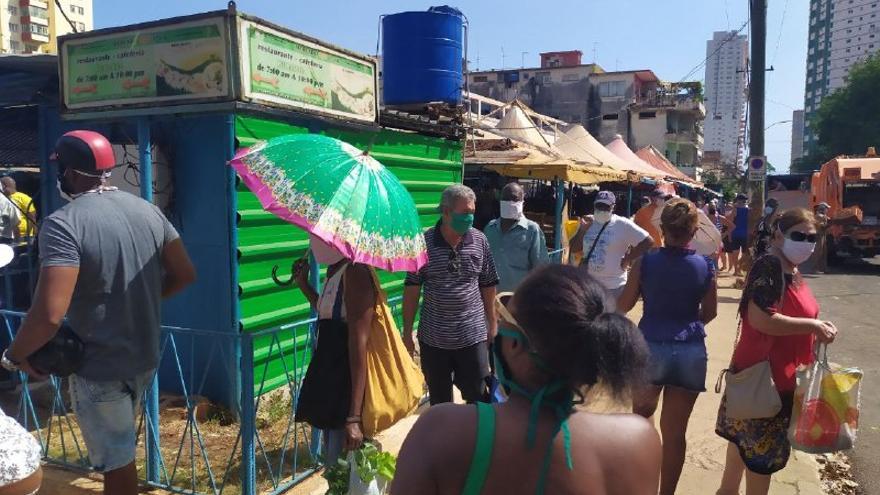
![]() 14ymedio, Havana, April 22, 2020 — Freelance vendors on mopeds pass through the Casino Deportivo neighborhood. They know that this is one of the most high-income areas in Havana. They offer the same products that require hours in line in front of a store, but which they will bring to people’s houses for twice and even three times the price.
14ymedio, Havana, April 22, 2020 — Freelance vendors on mopeds pass through the Casino Deportivo neighborhood. They know that this is one of the most high-income areas in Havana. They offer the same products that require hours in line in front of a store, but which they will bring to people’s houses for twice and even three times the price.
A package of frozen chicken that costs five CUC in the state market they will sell for twelve. “Don’t go out and put yourself at risk to buy this,” one vendor warned a lady who hesitated this past Tuesday. “Everything is brought to your door and without danger, because this merchandise is washed beforehand so that there is no contagion,” adds the man who is riding an electric moped.
Higher income families are ready to pay much more for the groceries than they cost a few weeks ago in order to avoid crowds. The resellers know this, and have begun to offer home delivery.
The greater part of the merchandise is filched from state storehouses, from hotel kitchens that have been paralyzed by lack of tourism, from stores where their own employees have redirected a portion of the stock to the black market, or from the so-called “gatherers” who stand on line several times or who go with their whole families in order to obtain a greater measure of the foodstuffs that are rationed.
Regarding these resellers and “gatherers”, Miguel Diez-Canel spoke yesterday, saying he had received many reports referring to those who are dedicated to these activities, along with others who wander about without apparent purpose despite the authorities’ appeal to stay at home unless it’s a necessity to go out.
“We have to act against these also, nobody here can be engaged in illicit activity, nobody here is authorized to sell or to resell anything, this cannot be permitted,” stated the leader in the daily meeting of the workers’ group for the prevention and control of coronavirus.
“What little we have we are trying to give out in the stores and in the distribution chains in our markets. And here, there is nothing to explain, it’s to act with severity, because these are the people who are making the situation more complicated,” he said.
The black market is getting ahold of the technologies that guarantee its survival and that elude control. Orders are broadcast via online portals for buying and selling, and by WhatsApp threads, Telegram groups or by word of mouth. The advertisements for the sale of ready-to-serve foods last but a few minutes on the most popular classified ad sites.
“I had it up until yesterday, but it’s already gone, call tomorrow to see if I have any more,” replied by telephone a freelance vendor who had announced an offer of cheese, ham, sausage and powdered milk on the website Revolico. “The merchandise took off!” he told an anxious buyer who had called some ten stores but without any success at all.
To evade the police, the vendors prefer to deliver to clients’ houses in order to prevent clients from coming to their own.”Hold up! Hold up! Let this person go by,” a householder in Nuevo Vedado was cautioned by the man who arrived downstairs at his house on an electric moped with his wife on board. Shortly, after an elderly man had disappeared down the street, the freelance vendor took from his knapsack two bags of powdered milk.
The man on the street took and rapidly placed the merchandise in another bag and pretended to shake hands to take his leave. In reality, he slipped two bills to pay for the purchase and to avoid the curious gazes of neighbors. The surveillance networks which until a few weeks ago had overlooked these operations, now are more alert.
“They have instructed us that we need to avoid people gathering in lines, and to keep a distance of a meter, but also that we make rounds in the neighborhood to identify the resellers,” explained 68-year-old Manuel, an activist in the Communist Party and denizen of El Cerro. With a green mask, the retired man patrols the vicinity of The Cupet in Ayestarán Street, a frequent hub of informal marketing.
“Yesterday, we discovered a couple of illegal operations selling agricultural products and also frozen foods. We turned them in at once to the High Command,” he explained. The penalties for these clandestine operations are difficult to foresee in a situation such as the present one in which the government applies punishments as away of setting examples.
Translated by: Pedro Antonio Gallet Gobin
___________________
COLLABORATE WITH OUR WORK: The 14ymedio team is committed to practicing serious journalism that reflects Cuba’s reality in all its depth. Thank you for joining us on this long journey. We invite you to continue supporting us by becoming a member of 14ymedio now. Together we can continue transforming journalism in Cuba.
